| Listing 1 - 10 of 10 |
Sort by
|
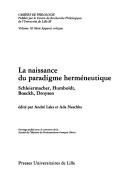
ISBN: 285939382X 9782859393823 Year: 1990 Volume: 10 Publisher: [Lille] : Presses universitaires de Lille,
Abstract | Keywords | Export | Availability | Bookmark
 Loading...
Loading...Choose an application
- Reference Manager
- EndNote
- RefWorks (Direct export to RefWorks)
Hermeneutics --- Herméneutique --- History --- Histoire --- Plato --- Humboldt, Wilhelm, --- Schleiermacher, Friedrich, --- Boeckh, August, --- Droysen, Johann Gustav, --- History. --- Herméneutique --- Humboldt, Wilhelm von, --- Plato. --- Hermeneutics - History.
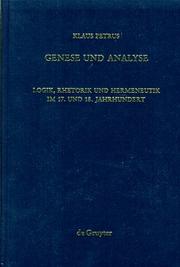
ISBN: 3110153947 3110820439 9783110153941 Year: 2013 Volume: 43 Publisher: Berlin ; Boston : De Gruyter,
Abstract | Keywords | Export | Availability | Bookmark
 Loading...
Loading...Choose an application
- Reference Manager
- EndNote
- RefWorks (Direct export to RefWorks)
Logic --- Rhetoric --- Hermeneutics --- History --- Interpretation, Methodology of --- Criticism --- Language and languages --- Speaking --- Authorship --- Expression --- Literary style --- Argumentation --- Deduction (Logic) --- Deductive logic --- Dialectic (Logic) --- Logic, Deductive --- Intellect --- Philosophy --- Psychology --- Science --- Reasoning --- Thought and thinking --- Methodology --- Logic - History - 17th century. --- Logic - History - 18th century. --- Rhetoric - History - 17th century. --- Rhetoric - History - 18th century. --- Hermeneutics - History - 17th century. --- Hermeneutics - History - 18th century.
Book
ISBN: 0745605117 0745602401 9780745605111 9780745602400 Year: 1987 Publisher: Cambridge Polity press
Abstract | Keywords | Export | Availability | Bookmark
 Loading...
Loading...Choose an application
- Reference Manager
- EndNote
- RefWorks (Direct export to RefWorks)
Hermeneutics --- History --- Gadamer, Hans-Georg, --- -Interpretation, Methodology of --- Criticism --- -Gadamer, Hans Georg --- -History --- Gadamer, Hans-Georg --- Metaphysics --- Theory of knowledge --- Hermeneutics - History - 20th century --- Gadamer, Hans-Georg, - 1900-2002
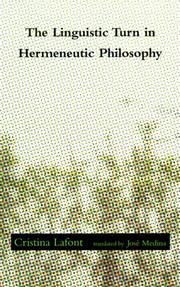
ISBN: 0262122170 026262169X 0262277867 0585190097 9780585190099 9780262277860 9780262122177 9780262621694 Year: 1999 Volume: *17 Publisher: Cambridge (Mass.) MIT press
Abstract | Keywords | Export | Availability | Bookmark
 Loading...
Loading...Choose an application
- Reference Manager
- EndNote
- RefWorks (Direct export to RefWorks)
Annotation The linguistic turn in German philosophy was initiated in the eighteenth century in the work of Johann Georg Hamann, Johann Gottfried von Herder, and Wilhelm von Humboldt. It was further developed in this century by Martin Heidegger, and Hans-Georg Gadamer extended its influence to contemporary philosophers such as Karl-Otto Apel and J?Habermas. This tradition focuses on the world-disclosing dimension of language, emphasizing its communicative over its cognitive function. Although this study is concerned primarily with the German tradition of linguistic philosophy, it is very much informed by the parallel linguistic turn in Anglo-American philosophy, especially the development of theories of direct reference. Cristina Lafont draws upon Hilary Putnam's work in particular to criticize the linguistic idealism and relativism of the German tradition, which she traces back to the assumption that meaning determines reference. Part I is a reconstruction of the linguistic turn in German philosophy from Hamann to Gadamer. Part II offers the deepest account to date of Habermas's approach to language. Part III shows how the shortcomings of German linguistic philosophy can be avoided by developing a consistent and more defensible version of Habermas' theory of communicative rationality.
Philosophy of language --- Theory of knowledge --- anno 1800-1999 --- Germany --- Language and languages --- Hermeneutics --- Philosophy, German --- Philosophy --- History --- -Hermeneutics --- -Language and languages --- -Philosophy, German --- -Foreign languages --- Languages --- Anthropology --- Communication --- Ethnology --- Information theory --- Meaning (Psychology) --- Philology --- Linguistics --- German philosophy --- Interpretation, Methodology of --- Criticism --- -History --- -Philosophy --- -Philosophy of language --- Foreign languages --- 19th century --- Philosophy [German ] --- 20th century --- SOCIAL SCIENCES/Political Science/Political & Social Theory --- PHILOSOPHY/General --- Language and languages - Philosophy - History - 19th century --- Hermeneutics - History - 19th century --- Philosophy, German - 19th century --- Language and languages - Philosophy - History - 20th century --- Hermeneutics - History - 20th century --- Philosophy, German - 20th century
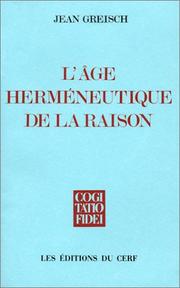
ISSN: 05876036 ISBN: 2204023574 9782204023573 Year: 1985 Volume: 133 Publisher: Paris Cerf
Abstract | Keywords | Export | Availability | Bookmark
 Loading...
Loading...Choose an application
- Reference Manager
- EndNote
- RefWorks (Direct export to RefWorks)
Hermeneutics --- Theology --- History --- 101.8 --- -Theology --- -#gsdb3 --- #GGSB: Dogmatiek --- #GGSB: Hermeneutiek (dogmatiek) --- Christian theology --- Theology, Christian --- Christianity --- Religion --- Interpretation, Methodology of --- Criticism --- Filosofie: methode; taalgebruik; filosofische taal --- -Hermeneutics --- History. --- 101.8 Filosofie: methode; taalgebruik; filosofische taal --- -101.8 --- #gsdb3 --- Herméneutique / en théologie. --- Hermeneutiek / in de godgeleerdheid. --- Dogmatiek --- Hermeneutiek (dogmatiek) --- Hermeneutics - History --- Theology - History - 20th century
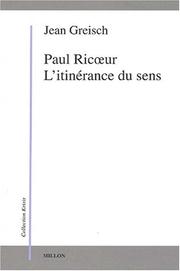
ISSN: 09856684 ISBN: 2841371182 9782841371181 Year: 2001 Publisher: Grenoble Millon
Abstract | Keywords | Export | Availability | Bookmark
 Loading...
Loading...Choose an application
- Reference Manager
- EndNote
- RefWorks (Direct export to RefWorks)
Cet ouvrage, forme le troisième volet d’un triptyque dédié aux différentes expressions que l’idée de phénoménologie herméneutique a reçues dans la philosophie du xxe siècle, se donne pour tâche d’analyser et d’évaluer la contribution de Ricœur à ce courant. Il se focalise d’abord sur la percée herméneutique de 1960, qui a pour arrière-plan une phénoménologie du volontaire et de l’involontaire et une anthropologie de la faillibilité. La seconde partie, placée sous l’égide du « Cogito narratif », retrace la genèse d’une herméneutique de la conscience historique sous le fil conducteur d’une analyse des opérations de mise en intrigue narrative dans le récit de fiction et le récit historique. La troisième partie dégage les principaux phénomènes qui étayent l’idée d’une phénoménologie du « sujet capable » qui domine les derniers travaux de Ricœur. Qu’il s’agisse de la capacité de se souvenir, d’oublier, de pardonner, de promettre ou de témoigner, ces recherches donnent tout son relief à la question kantienne : « Que m’est-il permis d’espérer ? ».
Hermeneutics --- Herméneutique --- History --- Histoire --- Ricoeur, Paul --- Ricœur, Paul, --- -Interpretation, Methodology of --- Criticism --- -Ricoeur, Paul --- Lü-ko-erh --- Ricœur, P. --- Li-kʻo, Pao-lo --- ريكور، بول --- ريكور، پول --- Рикёр, Поль --- Rikër, Polʹ --- -Ricœur, Paul. --- Ricœur, Jean Paul Gustave --- -History --- Herméneutique --- Ricœur, Paul --- Ricœur, Paul. --- Hermeneutics - History - 20th century. --- Ricœur, Paul, - 1913-2005
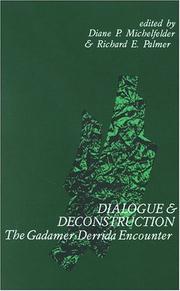
ISBN: 0791400093 0791400085 9780791400098 9780791400081 Year: 1989 Publisher: Albany State university of New York press
Abstract | Keywords | Export | Availability | Bookmark
 Loading...
Loading...Choose an application
- Reference Manager
- EndNote
- RefWorks (Direct export to RefWorks)
History of philosophy --- Derrida, Jacques --- Gadamer, Hans-Georg --- Hermeneutics --- Deconstruction --- History --- History. --- -Hermeneutics --- -Interpretation, Methodology of --- Criticism --- Semiotics and literature --- -Derrida, Jacques. --- Gadamer, Hans Georg --- Derrida, J. --- Derida, Žak --- Derrida, Jackes --- Derrida, Zhak --- Deridah, Z'aḳ --- Deridā, Jāka --- Dirīdā, Jāk --- Деррида, Жак --- -History --- Derrida, Jacques. --- דרידה, ז'אק --- Déconstruction (Philosophie). --- Déconstruction --- Déconstruction. --- Herméneutique --- Herméneutique. --- déconstruction --- Histoire. --- Histoire --- Derrida, Jacques, --- Gadamer, Hans Georg, --- Gadamer, Hans-Georg, --- Hermeneutics - History - 20th century. --- Deconstruction - History.
Book
ISBN: 3110328097 311032850X 9783868380323 Year: 2009 Volume: n.s., v. 9 Publisher: De Gruyter
Abstract | Keywords | Export | Availability | Bookmark
 Loading...
Loading...Choose an application
- Reference Manager
- EndNote
- RefWorks (Direct export to RefWorks)
Bei der Studie handelt es sich um eine Paragraphen für Paragraphen erläuternde Interpretation der ""Philosophischen Untersuchungen"". Sie wendet sich an alle an Wittgensteins Philosophie Interessierte, insbesondere an Studierende und Schüler. Inhaltlich setzt sie einen Schwerpunkt auf die Sprachphilosophie. Didaktisch versucht sie, den Text Schritt für Schritt verständlich zu machen, und Wittgensteins - oft implizit bleibende - Auseinandersetzungen mit anderen philosophischen Positionen (der philosophischen Tradition und der analytischen Sprachphilosophie) deutlicher hervortreten zu lassen. Da
Hermeneutics -- History -- 19th century. --- Language and languages -- Philosophy -- History -- 19th century. --- Language and languages -- Philosophy -- History -- 20th century. --- Philosophy & Religion --- Philosophy --- Language and languages --- Philosophy. --- Wittgenstein, Ludwig, --- Wei-tʻe-ken-ssu-tʻan, --- Wei-tʻe-ken-ssu-tʻan, Lu-te-wei-hsi, --- Wittgenstein, L. --- Vitgenshteĭn, L., --- Wei-ken-ssu-tʻan, --- Pitʻŭgensyutʻain, --- Vitgenshteĭn, Li︠u︡dvig, --- Weitegenshitan, --- Wittgenstein, Ludovicus, --- Vitgenshtaĭn, Ludvig, --- ויטגנשטיין, לודוויג --- 维特根斯坦, --- Wittgenstein, Ludwig Josef Johann,
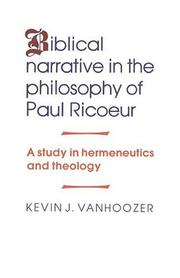
ISBN: 0521344255 0521043905 051159805X 9780521344258 9780511598050 9780521043908 Year: 1990 Publisher: Cambridge Cambridge University press
Abstract | Keywords | Export | Availability | Bookmark
 Loading...
Loading...Choose an application
- Reference Manager
- EndNote
- RefWorks (Direct export to RefWorks)
Although Paul Ricoeur's writings are widely and appreciatively read by theologians, this book offers a full, sympathetic yet critical account of Ricoeur's theory of narrative interpretation and its contribution to theology. Unlike many previous studies of Ricoeur, Part I argues that Ricoeur's hermeneutics must be viewed in the light of his overall philosophical agenda, as a fusion and continuation of the unfinished projects of Kant and Heidegger. Particularly helpful is the focus on Ricoeur's recent narrative theory as the context in which Ricoeur deals with problems of time and the creative imagination; and it becomes clear that narrative stands at the crossroads of Ricoeur's search for the meaning of human being as well as his search for the meaning of texts. Part II examines the potential of Ricoeur's narrative theory for resolving certain theological problems, such as the dichotomy betweens the Jesus of history and the Christ of faith.
Narration in the Bible --- Bible --- Hermeneutics --- History --- Philosophy --- 1 RICOEUR, PAUL --- -Hermeneutics --- -Narration in the Bible --- -#GROL:SEMI-1-05'19' Rico --- Interpretation, Methodology of --- Criticism --- Filosofie. Psychologie--RICOEUR, PAUL --- -History --- -Ricoeur, Paul --- Lü-ko-erh --- Ricœur, P. --- Li-kʻo, Pao-lo --- ريكور، بول --- ريكور، پول --- Рикёр, Поль --- Rikër, Polʹ --- -Ricœur, Paul. --- Ricœur, Jean Paul Gustave --- 1 RICOEUR, PAUL Filosofie. Psychologie--RICOEUR, PAUL --- #GROL:SEMI-1-05'19' Rico --- Ricœur, Paul. --- Ricœur, Paul --- Arts and Humanities --- Religion --- Narration in the Bible - History - 20th century. --- Bible - Philosophy - History - 20th century --- Hermeneutics - History - 20th century. --- Narration in the Bible. --- Criticism, Narrative

ISBN: 0415023092 0415058406 9780415058407 Year: 1990 Volume: vol *6 Publisher: London Routledge
Abstract | Keywords | Export | Availability | Bookmark
 Loading...
Loading...Choose an application
- Reference Manager
- EndNote
- RefWorks (Direct export to RefWorks)
Hermeneutics --- Literature --- Criticism (Philosophy) --- Herméneutique --- Littérature --- Criticisme --- History --- Philosophy --- Histoire --- Philosophie --- Ricoeur, Paul --- 1 RICOEUR, PAUL --- -Literature --- -Belles-lettres --- Western literature (Western countries) --- World literature --- Philology --- Authors --- Authorship --- Interpretation, Methodology of --- Criticism --- Filosofie. Psychologie--RICOEUR, PAUL --- -Philosophy --- -Ricoeur, Paul --- -Lü-ko-erh --- Ricœur, P. --- Li-kʻo, Pao-lo --- ريكور، بول --- ريكور، پول --- Рикёр, Поль --- Rikër, Polʹ --- Contributions in hermeneutics --- Contributions in literary criticism --- Philosophy. --- Ricœur, Paul --- Lü-ko-erh --- Ricœur, Jean Paul Gustave --- Contributions in hermeneutics. --- Contributions in literary criticism. --- -Filosofie. Psychologie--RICOEUR, PAUL --- 1 RICOEUR, PAUL Filosofie. Psychologie--RICOEUR, PAUL --- Herméneutique --- Littérature --- Literature and philosophy --- Philosophy and literature --- Theory --- Ricœur, Paul. --- 20th century --- Ricoeur, Paul - Contributions in hermeneutics. --- Ricoeur, Paul - Contributions in literary criticism. --- Literature - Philosophy. --- Hermeneutics - History - 20th century.
| Listing 1 - 10 of 10 |
Sort by
|

 Search
Search Feedback
Feedback About UniCat
About UniCat  Help
Help News
News